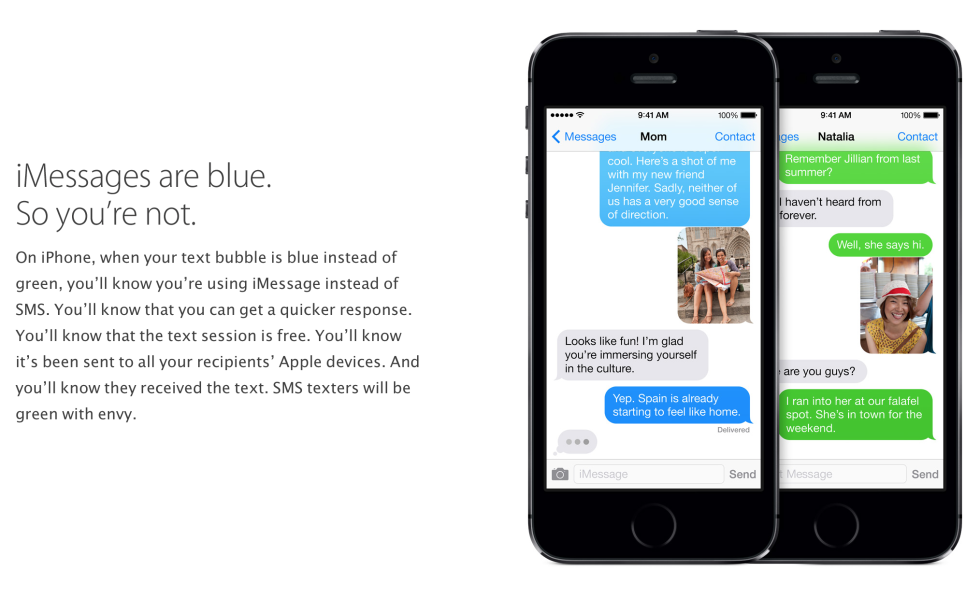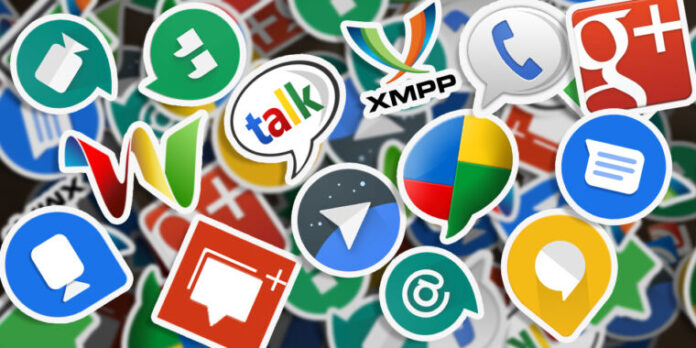Google took to Twitter this weekend to complain that iMessage is simply too darn influential with as we speak’s youngsters. The corporate was responding to a Wall Road Journal report detailing the lock-in and social strain Apple’s walled backyard is creating amongst US teenagers. iMessage manufacturers texts from iPhone customers with a blue background and offers them further options, whereas texts from Android telephones are branded inexperienced and solely have the bottom SMS characteristic set. In accordance with the article, “Teenagers and faculty college students mentioned they dread the ostracism that comes with a inexperienced textual content. The social strain is palpable, with some reporting being ostracized or singled out after switching away from iPhones.” Google apparently feels this can be a drawback.
“iMessage shouldn’t profit from bullying,” the official Android Twitter account wrote. “Texting ought to deliver us collectively, and the answer exists. Let’s repair this as one trade.” Google SVP Hiroshi Lockheimer chimed in too, saying “Apple’s iMessage lock-in is a documented technique. Utilizing peer strain and bullying as a solution to promote merchandise is disingenuous for an organization that has humanity and fairness as a core a part of its advertising and marketing. The requirements exist as we speak to repair this.”
The “answer” Google is pushing right here is RCS, or Wealthy Communication Companies, a GSMA customary from 2008 that has slowly gained traction as an improve to SMS. RCS provides typing indicators, consumer presence, and higher picture sharing to provider messaging. It’s a 14-year-old provider customary although, so it lacks many belongings you would need from a contemporary messaging service, like end-to-end encryption and help for nonphone units. Google tries to band-aid over the getting older customary with its “Google Messaging” shopper, however the result’s loads of clunky options which are not pretty much as good as a contemporary messaging service.
Since RCS replaces SMS, Google has been on a marketing campaign to get the trade to make the improve. After years of protesting, the US carriers are all onboard, and there may be some uptake among the many worldwide carriers, too. The largest holdout is Apple, which solely helps SMS although iMessage.

Apple
Apple has never publicly shot down the concept of including RCS to iMessage, however due to paperwork revealed within the Epic v. Apple case, we all know the corporate views iMessage lock-in as a helpful weapon. Bringing RCS to iMessage and making communication simpler with Android customers would solely assist to weaken Apple’s walled backyard, and the corporate has mentioned it would not need that.
Within the US, iPhones are extra well-liked with younger adults than ever. Because the Wall Road Journal notes, “Amongst U.S. shoppers, 40% use iPhones, however amongst these aged 18 to 24, greater than 70% are iPhone customers.” It credit Apple’s lock-in with apps like iMessage for this success.
Reaping what you sow
Google clearly views iMessage’s reputation as an issue, and the corporate is hoping this public-shaming marketing campaign will get Apple to alter its thoughts on RCS. Having Google give different firms recommendation on a messaging technique is a laughable concept although, since Google in all probability has the least credibility of any tech firm relating to messaging providers. If the corporate actually needs to do one thing about iMessage, it ought to strive competing with it.
As we not too long ago detailed in a 25,000-word article, Google’s messaging historical past is considered one of fixed product startups and shutdowns. Due to an absence of product focus or any form of top-down mandate from Google’s CEO, no division is actually “in cost” of messaging. As a consequence, the corporate has launched 13 halfhearted messaging merchandise since iMessage launched in 2011. If Google has anybody guilty for the iMessage’s dominance, it ought to begin with itself, because it has frequently sabotaged and deserted its personal plans to make an iMessage competitor.
Messaging is necessary, and even when it is not immediately monetizable, a dominant messaging app has actual, tangible advantages for an ecosystem. The remainder of the trade understood this years in the past. Fb paid $22 billion to purchase WhatsApp in 2014 and took the app from 450 million customers to 2 billion customers. Together with Fb Messenger, Fb has two dominant messaging platforms as we speak, particularly internationally. Salesforce paid $27 billion for Slack in 2020, and Tencent’s WeChat, a Chinese language messaging app, is pulling in 1.2 billion customers and yearly revenues of $5.5 billion. Snapchat is as much as a $67 billion market cap, and Telegram is getting $40 billion valuations from traders. Google retains attempting concepts on this market, however it by no means makes an funding that’s wherever near the competitors.


